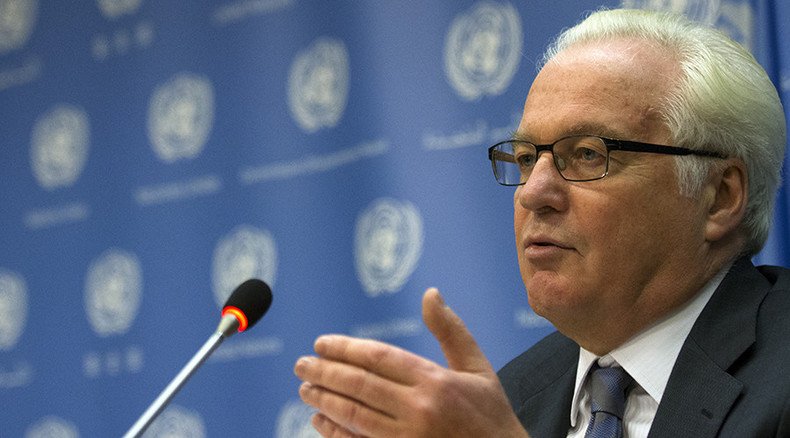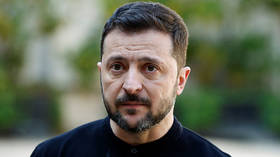UNSC veto right is crucial balance tool to avoid ‘disasters’ – Russia’s envoy Churkin
Assuming the UNSC presidency, Russia’s ambassador Vitaly Churkin said a compromise on Security Council reform is nowhere in sight, criticizing the “populist” idea of limiting veto powers which provide for minority opinions and guarantee balanced decisions.
During the press conference marking the beginning of the Russian presidency at the UNSC, Churkin pointed out there are two completely different issues concerning UNSC reform: The admission of new permanent members and proposals to limit their veto powers.
“The Security Council reform is a kind of negotiation which has been there for a long time,” Churkin explained. “We want a historic compromise to be reached between the two main camps: Those who want to have new permanent members and those who don’t want to have permanent members, and advocate a reform with a new category of intermediate countries which will be elected for a longer period of time than the current two years for the current non-permanent members.”
“At this point I don’t see this historic compromise anywhere near,” Churkin said.
Rare full house in #UN press room for Ambassador Vitaly Churkin as #Russia takes over #SecurityCouncil presidency pic.twitter.com/uxGVhfIgzi
— sophie pilgrim (@sophiepilgrim) September 2, 2015“On limiting the veto, it is a separate initiative…we are against it. This is not a workable proposition, this is not a workable scheme,” Churkin stated. According to him there are two main problems with the “populist” proposal to limit veto powers.
First of all, the initiative pushed forward by France would result in the UN General Assembly infringing on the prerogatives of the Security Council. Churkin pointed out that it is not difficult to put together a group of UN members that would effectively deprive a permanent member of its right of veto.
But the more important issue, according to Churkin, is the content of the proposed resolutions which a veto-deprived permanent members, as a result, would not be able to object to.
“The problem is not only the situation you are dealing with but what kind of proposal you are making to deal with the situation,” Churkin said. “What is the content of the resolution which is going to be put on the table and which a permanent member will not have a right to veto?”
Wednesday, 12.30 ET, press-conf by Amb Churkin on Russian Presidency in UNSC and work at #UNGAhttp://t.co/ompgVkRphSpic.twitter.com/41lC0OT9Ft
— Russian Mission UN (@RussiaUN) September 1, 2015“Sometimes absence of veto can produce disaster,” Churkin reminded, expressing his confidence that in terms of looking at Libya today, many would have been glad if Resolution 1973 had been vetoed.
“You cannot say that every resolution, which is proposed in the situation of dire humanitarian need, is necessarily a good resolution, which is going to resolve the problem and which is not going to be used for some political purposes,” he added.
“What if the resolution says that ‘we are going ahead to occupy the country and bomb them to the Stone Age’? What if mass atrocities are committed by terrorist groups and the government is trying to fight those terrorist groups and somebody says ‘Well, listen, there are mass atrocities and the government is not coping – so let’s go ahead and occupy the country’?” Churkin wondered.
“We see it is a populist proposal. If France wants to limit its veto, they are welcome, but there are some permanent UNSC members – not just Russia – who understand how important it is as a tool which allow the UNSC to produce balanced decisions and which allows the minority opinion to be reflected in the work of the UNSC,” Churkin concluded.
Churkin also spoke about the necessity of the joint international coalition against jihadist group Islamic State (IS, formerly ISIS/ISIL) and said that Russia is ready for cooperation, but would not join the current US-led coalition which does not have a UN mandate.
#Russia's Vitaly Churkin briefs #UN press on #SC presidency - makes it interesting on #Syria#Libya#Yemen#vetopic.twitter.com/vSkaxIpKS7
— Carole Landry (@carlandry_afp) September 2, 2015“They bomb the Syrian territory without the consent of the Syrian government and without authorization from the Security Council … they cannot figure out their priorities. We believe that clearly the priority now is to fight ISIL but they cannot make their choice between fighting the Syrian government and ISIL,” Churkin said.
The Russian ambassador also expressed concerns that some of the UNSC members are indirectly encouraging Saudi-led military intervention in the Yemeni conflict.
“It is well-known that the United States and the United Kingdom, I think too, are providing voices of support for this operation,” Churkin said. “So they share the responsibility for what is going on.”
Russia’s permanent representative to the UN, Vitaly Churkin, took over the rotating leadership of the UNSC from the permanent representative of Nigeria, Uche Joy Ogwu, on Tuesday.
During his hour-long Wednesday briefing Churkin also commented on the situation in eastern Ukraine, South Sudan and Palestine, and briefly outlined the September program for the 15-member Security Council under Russian presidency.














